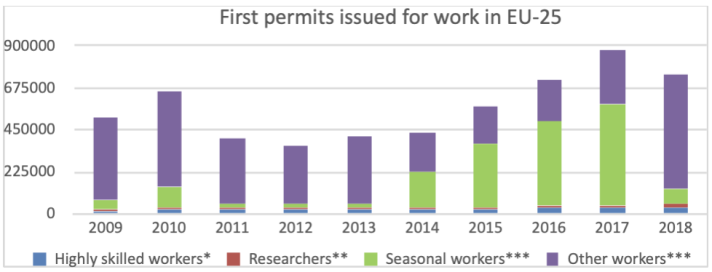
The Directive also gives many non-EU nationals working in the EU the right to be treated equally to EU nationals in many respects, including:
The rules of the Directive cover most non-EU workers who are admitted to an EU country for work, whether on the basis of the country's national rules or EU laws. Some non-EU nationals are excluded from the Directive, such as seasonal workers and posted workers. Persons admitted for other reasons, such as family reunification, are covered for equal treatment, if they work.
In April 2024, a political agreement on the Commission's proposal for a recast Single Permit Directive was reached between the Council and the European Parliament, and the recast entered into force on 24 April 2024. Its aim is to make the application procedure for a single permit more efficient, reduce the long duration of application procedures, increase the EU's attractiveness, and address labour shortages. EU countries (excluding Denmark and Ireland) have until 22 May 2026 to transpose the Directive into national law. From 22 May 2026, the Single Permit Directive of 2011 will be repealed.
The recast of the Single Permit Directive makes the application procedure for the single permit more efficient. The application for the single permit can be submitted by the applicant either while still residing in a non-EU country or while residing in the EU country concerned, if the applicant already holds a valid residence permit. This should help reduce the long duration of application procedures, which often deter employers from international recruitment, and help increase the EU's attractiveness.
The recast also includes new requirements to strengthen the safeguards and equal treatment of non-EU nationals as compared to EU citizens, and improve their protection from labour exploitation.
Under the proposed new rules, the single permit will not be linked to one employer alone. This means that within the period of validity of the permit, workers will have the right to change employers while continuing to reside legally in the EU country concerned. The possibility to change one's employer can be restricted by EU countries, who can make it subject to labour market checks, require that the change be notified, and impose a minimum period (not exceeding six months), during which the single permit holder is required to work for their first employer.
In addition, unemployment of the single permit holder, provided that it does not exceed three months and is notified to the authorities of the EU country concerned, will not constitute a reason for withdrawing the single permit.
Furthermore, the recast includes new obligations for EU countries to provide for:
Each year, around 3 - 3.5 million non-EU nationals reside in the EU primarily for work. These workers help responding to the need for workers in the EU economies, which is not fully met by EU workers.

Source: Eurostat database [migr_ressoc] as of 1.10.2019.NB. Figures for 2018 are still preliminary. *Highly skilled workers are not reported separately in all Member States, and this statistic excludes EU Bluecard permits.. **Researchers are not reported as workers in all Member States. *** Poland reported large numbers of Seasonal workers between 2014 and 2017, some are reported as others in 2018 others as seasonal workers now when the Seasonal workers Directive applies fully.
The Single Permit Directive covers most other workers, highly skilled workers and as regards equal treatment researchers. This graph shows all permits issued (new or renewed) for different reasons since 2013.
Source: Eurostat database [migr_ressing] as of 1.10.2019.NB. *Figures for 2018 are still preliminary.